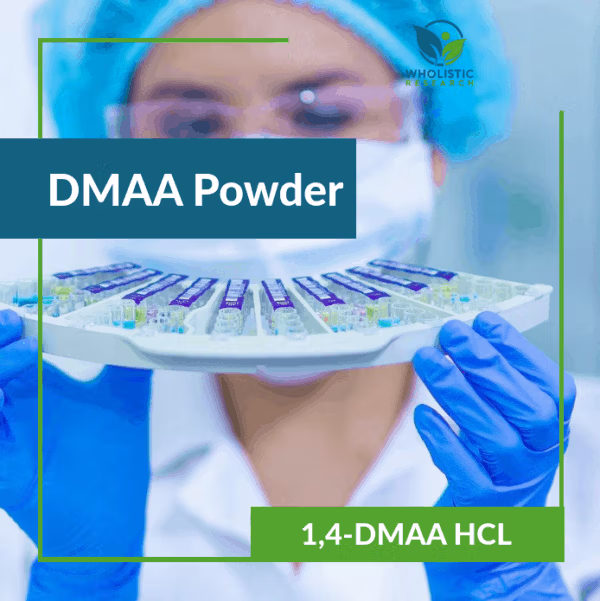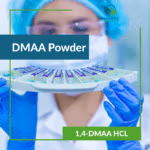
DMAA Powder 1g
- Stimulates Energy
- Improves Short-Term Memory
- Improves Physical Performance
- Helps Burn Fat
- Independently Tested (3rd Party CoA Provided)
- 30-Days Money-Back Guarantee
Description
If you work out regularly, at some point, you might need a little boost to get you through your workout.
Everyone, at some point, hits a performance plateau in their fitness routine that seems impossible to overcome.
It’s your body’s natural limit, and it works as a barrier to physical performance so that you don’t max out your body’s natural reserves of energy.
When bodybuilders and fitness fans reach that limit, they often grasp at energy supplements to push them through to the other side and stay on task.
DMAA is one of the supplements that come up often to give a boost of both energy and focus needed to stay on task and work through their performance plateau.
But what is DMAA?
In this article, we’ll cover all of the basics of this powerful drug, provide information on proper dosage and how to use it, and offer suggestions on where to buy DMAA products if you think you might want to try this powder.
What Is DMAA?
DMAA or Dimethylamylamine was initially developed by the pharmaceutical company Eli Lilly in 1944 as a nasal decongestant. It’s also known as methylhexanamine HCI and goes by a variety of other more standard names. Since its invention in the 1940s, the Food and Drug Administration (FDA) stopped production of it as a nasal decongestant due to possibly dangerous side effects.
These days you can often find DMAA and related products in use among a variety of athletes, bodybuilders, and fitness aficionados, as well as weight loss advocates. It’s considered a nootropic drug that primarily affects the brain, helping it produce and receive chemical transmissions from neurotransmitters like dopamine and serotonin.
In the case of DMAA, it works particularly well as a boost to the production and reception of norepinephrine, which works much like adrenaline to help focus the mind.
The norepinephrine helps prepare the body for focused action by creating an artificial ‘flight or fight’ response, which helps constrict blood vessels and optimize the body’s performance, assisting users in building muscle and losing weight.
The brain becomes clearer, perception more vivid, and the muscles prepare for exertion, which is why DMAA became so popular with weight lifters and bodybuilders who struggle with their workout routine.
Unfortunately, there is no medical research supporting fat loss and bodybuilding uses for DMAA. It isn’t technically illegal, but it is a banned substance from most professional sports, and there are many possible dangerous side effects to consider when using it. If you do decide to buy DMAA powder, you’ll likely encounter a clear warning that it is ‘not for human consumption.’
How to Use DMAA
There is a little confusion on the internet about the proper usage of DMAA. It generally comes in a jar or a bag from various distributors, but you should invest in appropriate measuring equipment to guarantee the correct dosage. Taking too much can cause issues if you’re not careful.
Because DMAA comes in a powdered form, you can mix it in with your pre-workout drink or foods. Mix it around a little to let it fully dissolve for the best results. You can also put it in your water, but make sure you read the advisory labels carefully and never take more than the recommended dosage.
Dosage
There isn’t any research using specific scientific parameters, which makes understanding the proper DMAA powder dosage difficult.
The best we can do is go off of other user’s experiences and cautions while maintaining the position that you should start with a low dosage to determine how the drug affects you.
With only other user’s experience to provide a guideline, it seems a standard dose is anywhere between 10-20 milligrams (mg), which you can take every few hours to a total of 40-60 mg.
Make sure you give your body some time to process the 1,4 DMAA or 1,3 DMAA so that you don’t risk some of the more hazardous side effects – like high blood pressure.
Find an accurate supplement scale and measurements to prepare the proper dosage accurately.
If you’re going to use this product, start slow with a minimal amount and see how your body reacts to it. You can always increase your dosage as needed, within reason.
Side Effects
The most significant issue with this drug is that the FDA has not rigorously tested it. So it’s difficult to say anything certain about possible side effects.
DMAA was used as a nasal decongestant up until the 1970s, but since then, there has been little scientific testing on its properties, benefits, and possible reactions. We can only guess some of the aftereffects from users who’ve tried it, and the research done long ago.
It’s safe to say that some of the possible side effects include elevated heart rate, a tightening in the chest, and higher blood pressure. It may also cause shortness of breath, heart arrhythmias or murmurs, cardiovascular issues, and psychological conditions such as anxiety and stress.
DMAA’s primary characteristic is mimicking the flow of adrenaline in the system. Therefore, these side effects should come as no surprise when considering the known properties of prolonged adrenaline in the body.
There is also some evidence that it may elevate the risk of stroke, so users are encouraged to consult with their doctor before taking it and read up on other customer’s experiences in place of legitimate scientific data.
Where to Buy DMAA Powder?
Because it isn’t an officially approved drug, you likely can’t find DMAA powder in any storefronts or your local fitness supplements store. DMAA sells almost exclusively online through websites such as Science.bio. You can get DMAA powder and many other supplements, including a variety of other nootropic supplements with fast shipping straight to your home.
The market for DMAA is entirely unregulated, so you should take care when buying these products.
DMAA also sells under a variety of different names, so you may want to search specifically for DMAA or Dimethylamylamine to make sure you’re getting the right stuff without any fillers or additives added to the powder.
And try to avoid stacking DMAA with caffeine if you can as it can increase the chance for harmful side effects.
Frequently Asked Questions (FAQ)
Your questions answered.
What Does DMAA Do to the Body?
Like other norepinephrine producers, DMAA constricts blood vessels, increases the heart rate, and activates neuroreceptors. This drug provides an artificial adrenaline boost that helps users focus and work harder on building muscle.
The constriction of the blood vessels may cause cardiovascular issues in some users, so take only the recommended amount and stop if you have shortness of breath or sudden heart murmurs.
Does DMAA Make You High?
DMAA doesn’t give you a traditional ‘high’ like many psychotropics, but it does work similarly to cocaine and methamphetamine, but without the associated psychotropic attributes. Bodybuilders use it to increase the adrenaline, which narrows the focus and improves performance.
Conclusion
DMAA is a powerful drug, and users should be cautious. Most of DMAA’s benefits come with the possibility of serious side effects, which you should consider before experimenting with them. But it can work well if you need something to boost your focus and help you concentrate on the task of weight-lifting or fitness. Start slow and see how well your body handles it.






Josh –
Makes for a good pre-workout. I get more drive and focus.